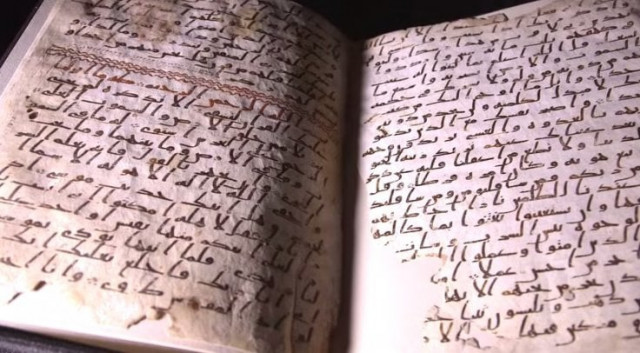British university says its Quran manuscript is among world's oldest
Radiocarbon dating shows that the parchment folios held by the University of Birmingham were at least 1,370 years old

one of the oldest fragments of the Quran have been found by the University of Birmingham. PHOTO: BBC
Radiocarbon dating indicated that the parchment folios held by the University of Birmingham in central England were at least 1,370 years old, which would make them one of the earliest written forms of the Islamic holy book in existence.
Researchers said the manuscript consisted of two parchment leaves and contained parts of Suras (chapters) 18 to 20, and was written with ink in an early form of Arabic script known as Hijazi.
Read:Russia sees a threat in its converts to Islam
 The University of Birmingham's manuscript was in a collection brought back from the Middle East. PHOTO: BBC
The University of Birmingham's manuscript was in a collection brought back from the Middle East. PHOTO: BBCThe radiocarbon dating, said to have a 95.4 per cent accuracy, found the parchment dated from between 568 and 645.
Tears of joy
The manuscript was part of the university's collection of 3,000 Middle Eastern documents which was acquired in the 1920s by Alphonse Mingana, a Chaldean priest born near Mosul in Iraq.
Read: US Muslims fight negative image of Islam
His trips to acquire the manuscripts were funded by philanthropist Edward Cadbury to raise the status of Birmingham as an intellectual centre for religious studies.
"The parts of the Quran that are contained in those fragments are very similar indeed to the Quran as we have it today," Thomas said. "So this tends to support the view that the Quran that we now have is more or less very close indeed to the Quran as it was brought together in the early years of Islam."
The university said it will put the manuscript on public display in October, and Muhammad Afzal, chairman of Birmingham Central Mosque, said he expected it to attract people from all over Britain.
"When I saw these pages I was very moved. There were tears of joy and emotion in my eyes," he told the BBC.



















COMMENTS
Comments are moderated and generally will be posted if they are on-topic and not abusive.
For more information, please see our Comments FAQ